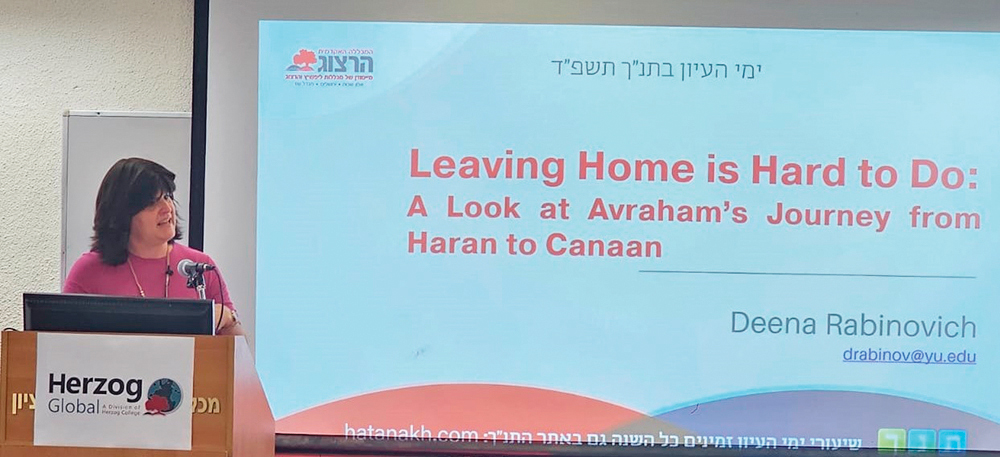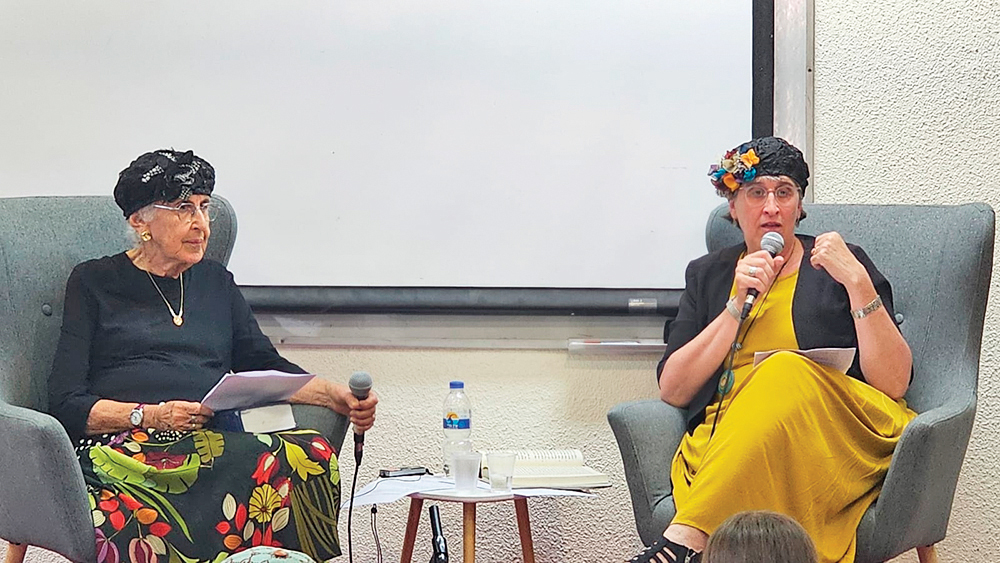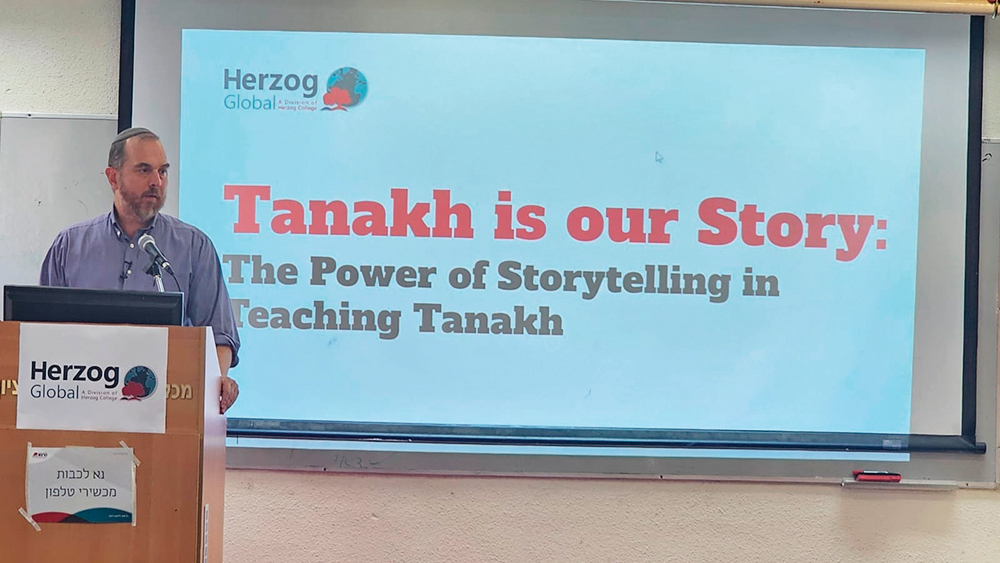
I am writing these words literally in the midst of a regional crisis in the Middle East, with Iran and its proxies threatening to attack Israel any minute—there couldn’t have been a more appropriate way to spend the day than at the Herzog Global Jewish Educators’ Day, taking place as part of the annual Tanakh Yemei Iyun, in Alon Shvut, Gush Etzion. The purpose of the one-day program is to be a refresher and networking day for Jewish educators from both Israel and around the globe—going over basic skills of how to format worksheets, teach texts, engage with students and transmit Jewish tradition and faith.
There were several speakers from New Jersey and New York at the August 5 event, including Rabbi Dr. J.J. Schacter of Teaneck and Dr. Deena Rabinovich from Kew Garden Hills. Gitta Neufeld comes every year from Far Rockaway. She was and always is the first person to book for the Yemei Iyun—she uses money that she won on a TV quiz show in 2013, and today she is a senior educator in the Syrian Jewish community in Brooklyn.
Rabbi Reuven Spolter, director of English-language programs at Herzog Global, said: “We are so proud to invite a diverse group of world-renowned Jewish educators to focus on the topic of effective education in the kodesh classroom. So much of limudei kodesh is about chomer—teaching material and skills—which can often be dry and abstract. Throughout the day, we focused on different ways not only to teach material, but to create connection and deep spiritual meaning for our students in their Torah, Navi and limudei kodesh studies.”

Rabbi Moshe Taragin, teacher at Herzog College, added: “With our return to Israel, we have also returned to the book of our history and of our land. Tanach study, which had been neglected for generations, has undergone a remarkable renaissance. The Tanach conference is a celebration of this significant resurgence of Torah. It is profoundly symbolic that as we battle on behalf of Jewish history and our rights to our homeland that 5,000 people immerse themselves in the Book of Prophecy and Jewish history. The looming threat of an Iranian attack was on everyone’s minds.
“The stream of people thirsting for Torah study reminded us of the eternal nature of Torah and the enduring spirit of the Jewish people. We pray that Hashem looks kindly upon our dedication to studying His book. Today’s educators program is essential, as it equips our teachers with critical skills of how best to teach the next generation and imbue in them a love of Tanach.”
How appropriate that in these times, the first class by Rabbi Reuven Spolter, entitled “Tanakh Is Our Story,” quoted the famous first rashi in the book of Bereishit 1:1, that the land of Israel belongs to Hashem and was given to Am Yisrael—and we didn’t steal it from them. Rabbi Spolter went on to talk about yetziyat Mitzrayim and how to teach using stories—both through engaging in texts and transmitting the experience itself. He emphasized the importance of teaching meaning and values through texts and commentators.

After Rabbi Spolter, Dr. Deena Rabinovich spoke about building effective learning into your curriculum. She spoke about affective education for effective education. She discussed the big ideas and central themes we start with—for instance, Maaseh Avot Siman Levanim, Bchirah and Dchiya and how these ideas should affect our teaching. She used the story of Avraham leaving his home and spoke about how to plan a lesson—thinking about the “Big Ideas” and “Big Questions” and how to balance between cognitive and experiential learning, transmitting on the one hand skills and on the other values.
She also taught pedagogical skills, based on the method of Nechama Leibovitz. For instance, how to answer difficult questions, how to make students think, how to transmit ideas using texts and how to teach soft skills (such as determination and how to overcome obstacles) as well as hard skills (such as textual skills).
Rabbi David Weinberg spoke about “Tanakh as Invitation to Divine Dialogue” and how to teach Torah in a way where students feel they are in dialogue with Hashem. Quoting from Rav Soloveichik, Rav Steinsaltz and Rebbe Nachman, he discussed how teachers need to read the Torah in a manner of a dialogue. Text isn’t just to be studied, but while doing so, the teacher needs to generate a relationship—a dynamic force speaking to you, and the author of the text (Hashem) demands a response. He developed the idea, how in the classroom the teacher needs to turn Torah into a tefillah—through engagement with texts and students.
Rabbi Menachem Leibtag and Sarah Golubtchik gave a workshop about using questions to stimulate critical textual study. After lunch, there was a panel discussion, led by Rabbi Spolter—including Rabbi Dr. J.J. Schacter, Dr. Deena Rabinovich and Gitta Neufeld—entitled “Beyond the Text: How Can We Effect Change Inside the Classroom?”

For me, the most inspirational and memorable session was the last—a conversation between Dr. Tovah Lichtenstein and her daughter, Rabbanit Esti Rosenberg, about using biblical personalities as role models. Dr. Lichtenstein spoke about Rivka and Tzipora and the challenges and expectations of being wives of leaders and holy men. Rabbanit Rosenberg spoke about Noach and Avraham and the centrality of mesirut nefesh (self-sacrifice) and faith.
They then dedicated their talk to the wives and families of miluimnikim—soldiers who had been fighting since October 7 in Gaza, the north and elsewhere. Dr. Lichtenstein spoke about the wives of miluimnikim as well, helping their husbands reconnect during short visits at home.
Rabbanit Rosenberg spoke about the miluimnikim who were able to synthesize being God-fearing men and women, being willing to die ‘Al Kiddush Hashem’ while carrying on and fighting even after they had lost comrades and seen them get injured. This, she said, was the true character of a biblical hero—mesirut nefesh.
Professor Mahnaz Shmalo, a teacher at Stern and Touro College, said, “I have a very strong connection to the land of Israel and before living in Passaic [NJ] I lived in Telzstone, Kiryat Yearim. Today’s program is an excellent opportunity to also learn and educate myself on how to address the spiritual needs of my students, through the teaching of Tanach.”
Rabbi Benjy Kramer, a teacher at the Yeshivah of Flatbush, from Edison, said, “It is a real privilege to join with so many educators and lovers of Tanach at this epicenter of Tanach teaching, Herzog College.”
Rivky Krestt, who teaches at Midreshet Lindenbaum, said, “I’m here to connect with Jewish educators and to be exposed to what is being discussed on the ground—to grow as an educator.”
Learn more about Herzog Global, a division of Herzog College at https://global.herzog.ac.il
Benjy Singer lives in Jerusalem and is a freelance journalist covering Jewish world and Israel stories. He can be reached at benjysingert@hotmail.com.








